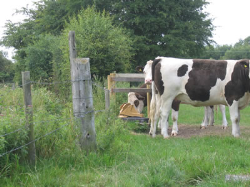
Hampshire livestock are helping conserve the wildlife of our rare chalk streams by learning to pump their own drinking water from the river.
This novel initiative is part of the Test and Itchen Landcare Project, which consists of a partnership between the Environment Agency, Hampshire Wildlife Trust, NFU, CLA, AICC, Defra, Hampshire County Council and English Nature. The project has given free livestock-operated drinking pumps to farmers, to help reduce sediment and nutrients entering the water from the riverbank.
Chalk streams are characterised by clean riverbed gravel that is essential for many riverine species such as trout, salmon, lamprey and Brook water-crowfoot. But increased sediment in chalk streams has been a major factor in the decline of salmon and trout as it smothers riverbed gravels that house their eggs and fry, depriving them of oxygen.
When cattle gather in favourite drinking areas they can trample riverbanks and cause severe erosion, resulting in sediments washing down the river. Winter rainfall can escalate these effects. Although, ironically, the lack of rain in recent years has made the problem worse, as winter flows can help flush sediments through the system and out to sea.
The Test and Itchen Landcare Project has distributed 35 livestock-operated pumps. Once installed, badly eroded sections of riverbank were fenced to make them stable. This will also improve bankside habitat for many species. The results have been very positive so far, with the naturally curious nature of cattle meaning they have quickly learnt to use the pumps.
Test and Itchen Landcare Officer Chris Giles said: "This project will greatly benefit the local environment. Restricting livestock access to the river will improve the health of cattle, conserve and enhance riverine habitats, improve water quality, and protect against loss of agricultural land."
Chris added: "Pasture pumps are not a new idea, but those available today are far more efficient and economical. We need to ensure that they are reliable and have a positive impact on the farm business".
Bankside erosion and sediment deposition are natural processes and essential to many chalk stream species. This initiative is not an attempt to stop the process or fence the entire riverbank, but to reduce the pollutants in areas of concern, particularly where nutrients are reaching the river.
While many farm businesses will already adopt measures within their management, the Landcare Project is working with farmers to tackle diffuse pollution, identifying opportunities to make changes and improve profits, and to assist with the transition and implementation of Cross Compliance and Environmental Stewardship.
